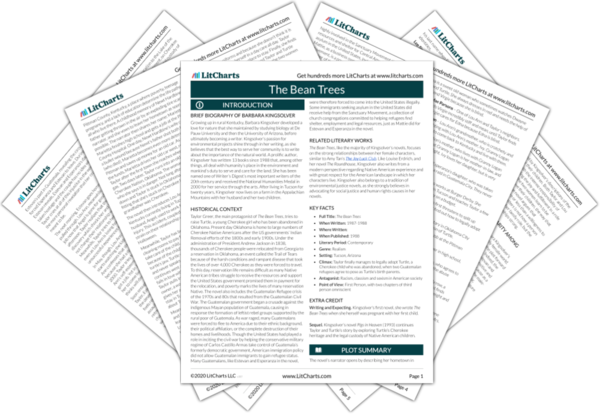The theme of belonging and homeland works on two levels within the novel. On a small scale, the novel’s plot follows Taylor’s struggles to find her true home. Unhappy with the classism and sexism of her rural Kentucky hometown, Taylor searches for a place that feels more comfortable. Through this search, Kingsolver points out that the place where a person is born is not necessarily where that person belongs. When Taylor settles in Arizona, she feels that she has found her new home both because of her own affinity for the desert landscape and the community that builds with the people of Tucson. Taylor’s openness to the new culture and her appreciation and respect for the previous communities of Arizona allow her to make Arizona her new homeland.
On a large scale, the novel asks who truly “belongs” on American land. Though Taylor has Cherokee blood, she does not feel like she belongs on the territory that was stolen from Native American tribes, and believes that her adopted daughter Turtle, a full-blooded Cherokee child, deserves to live in America more than she does. Yet this idea of Native American connection to the land is complicated by the novel’s setting in Arizona. This desert state is nothing like the ancestral Cherokee homelands in Georgia, and furthermore has a vibrant Native American culture of its own that also experienced displacement. While Turtle’s ancestry may be more “American” than Taylor’s, neither of them truly “belongs” in Arizona.
After considering the history surrounding the acquisition of American land, Kingsolver then examines American hypocrisy regarding immigration in the 20th century. Though virtually all Americans (aside from Native American populations) are here thanks to the immigration of their ancestors, Kingsolver notes how some American citizens today feel strongly that new immigration should be stopped at all costs. Even though Estevan and Esperanza are in some ways more qualified to be American than Taylor, given Estevan’s expert command of the English language as a teacher of English, their place in America is extremely tenuous. Though American settlers effectively invaded the southwest United States during the Gold Rush boom of the 1800s, the descendants of these American settlers now resent what they refer to as the “invasion” of Central Americans into the area. Kingsolver suggests that those who are against immigration to the United States should reevaluate what it means to be an American, and face up to their own family history as immigrants.
Belonging and Homeland ThemeTracker

Belonging and Homeland Quotes in The Bean Trees
There were two things about Mama. One is that she expected the best out of me. And the other is that then no matter what I did… she acted like it was the moon I had just hung up in the sky and plugged in all the stars; Like I was that good.

Unlock explanations and citation info for this and every other The Bean Trees quote.
Plus so much more...
Get LitCharts A+She put her hands where the child’s shoulders might be, under all that blanket, and pushed it gently back into the seat, trying to make it belong there. She looked at it for a long time. Then she closed the door and walked away.
As I watched her I was thinking that she wasn’t really round. Without the child and the blanket she walked away from my car a very thin woman.
This whole conversation had started with a rhyme he used to help his students remember how to pronounce English vowels…Lou Ann and I had already told him three or four times that he spoke better English than the two of us combined.
Mrs. Parsons said, “And is this naked creature one of theirs? She looks like a little wild Indian.” She was talking about Turtle, who was not naked, although she didn’t exactly have a shirt on… “She’s mine,” I said. “And she is a wild Indian, as a matter of fact.”
“You are poetic, mi’ija.”
“What’s miha?”
“Mi hija,” he pronounced it slowly.
“My something?”
“My daughter. But it doesn’t work the same in English. We say it to friends. You would call me mi’ijo.”
“You think you're the foreigner here, and I’m the American, and I just look the other way while the President or somebody sends down this and that . . . to torture people with. But nobody asked my permission, okay? Sometimes I feel like I'm a foreigner, too.”
“A human being can be good or bad or right or wrong, maybe. But how can you say a person is illegal? You just can't. That's all there is to it.”
“That looks beautiful,” I said. “That's the Cherokee Nation?”
“Part of it,” she said. “It's real big. The Cherokee Nation isn’t any one place exactly. It’s people. We have our own government and all.”











